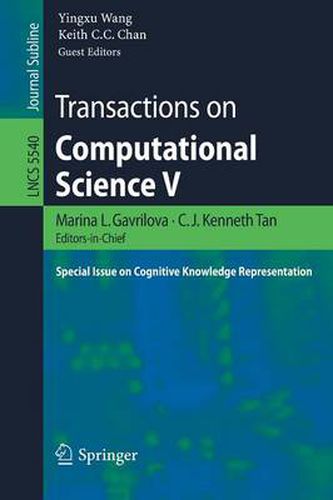Readings Newsletter
Become a Readings Member to make your shopping experience even easier.
Sign in or sign up for free!
You’re not far away from qualifying for FREE standard shipping within Australia
You’ve qualified for FREE standard shipping within Australia
The cart is loading…






This title is printed to order. This book may have been self-published. If so, we cannot guarantee the quality of the content. In the main most books will have gone through the editing process however some may not. We therefore suggest that you be aware of this before ordering this book. If in doubt check either the author or publisher’s details as we are unable to accept any returns unless they are faulty. Please contact us if you have any questions.
The LNCS journal Transactions on Computational Science reflects recent developments in the field of Computational Science, conceiving the field not as a mere ancillary science but rather as an innovative approach supporting many other scientific disciplines. The journal focuses on original high-quality research in the realm of computational science in parallel and distributed environments, encompassing the facilitating theoretical foundations and the applications of large-scale computations and massive data processing. It addresses researchers and practitioners in areas ranging from aerospace to biochemistry, from electronics to geosciences, from mathematics to software architecture, presenting verifiable computational methods, findings and solutions and enabling industrial users to apply techniques of leading-edge, large-scale, high performance computational methods.
The fifth volume of the Transactions on Computational Science journal, edited by Yingxu Wang and Keith C.C. Chan, is devoted to the subject of cognitive knowledge representation. This field of study focuses on the internal knowledge representation mechanisms of the brain and how these can be applied to computer science and engineering. The issue includes the latest research results in internal knowledge representation at the logical, functional, physiological, and biological levels and describes their impacts on computing, artificial intelligence, and computational intelligence.
$9.00 standard shipping within Australia
FREE standard shipping within Australia for orders over $100.00
Express & International shipping calculated at checkout
This title is printed to order. This book may have been self-published. If so, we cannot guarantee the quality of the content. In the main most books will have gone through the editing process however some may not. We therefore suggest that you be aware of this before ordering this book. If in doubt check either the author or publisher’s details as we are unable to accept any returns unless they are faulty. Please contact us if you have any questions.
The LNCS journal Transactions on Computational Science reflects recent developments in the field of Computational Science, conceiving the field not as a mere ancillary science but rather as an innovative approach supporting many other scientific disciplines. The journal focuses on original high-quality research in the realm of computational science in parallel and distributed environments, encompassing the facilitating theoretical foundations and the applications of large-scale computations and massive data processing. It addresses researchers and practitioners in areas ranging from aerospace to biochemistry, from electronics to geosciences, from mathematics to software architecture, presenting verifiable computational methods, findings and solutions and enabling industrial users to apply techniques of leading-edge, large-scale, high performance computational methods.
The fifth volume of the Transactions on Computational Science journal, edited by Yingxu Wang and Keith C.C. Chan, is devoted to the subject of cognitive knowledge representation. This field of study focuses on the internal knowledge representation mechanisms of the brain and how these can be applied to computer science and engineering. The issue includes the latest research results in internal knowledge representation at the logical, functional, physiological, and biological levels and describes their impacts on computing, artificial intelligence, and computational intelligence.